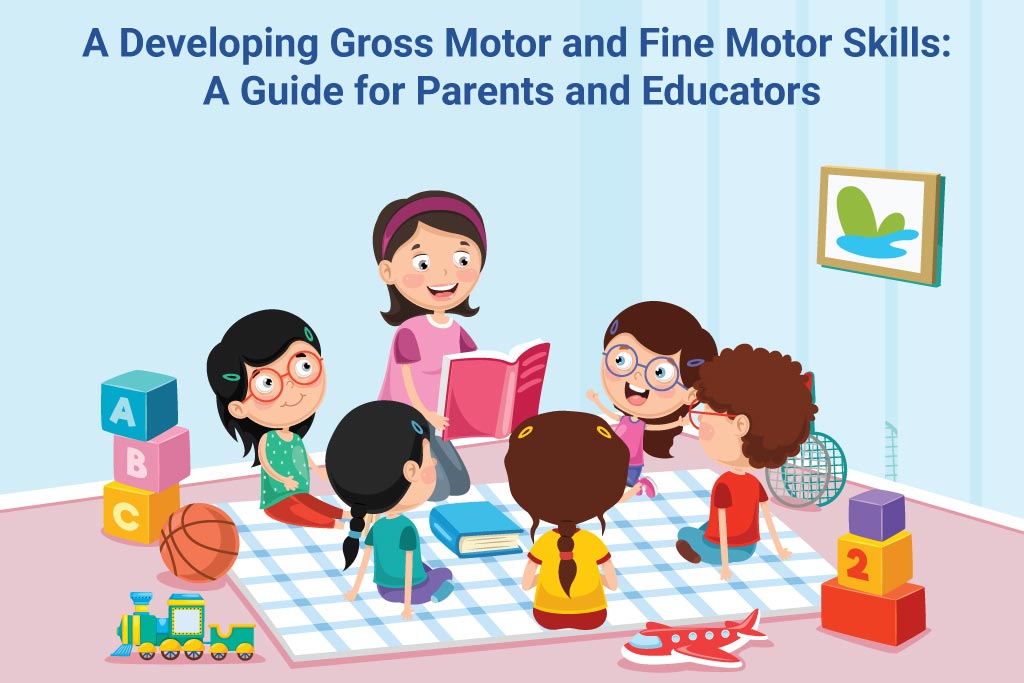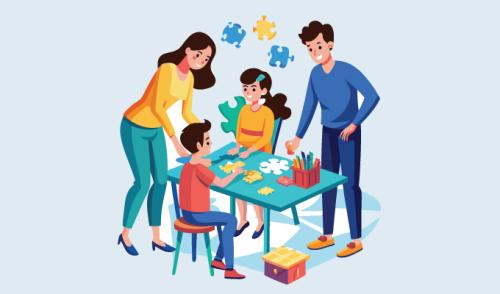Gross and Fine Motor Skills: Guide for Parents and Teachers
Motor skill development in children is vital for growth, daily tasks, learning, and confidence. Whether running on the playground or drawing the first picture, gross and fine motor skills activities shape how they interact with the environment. These abilities are essentially nurtured from early childhood and, with the help of parents and teachers, are set on a path of total physical, cognitive, and emotional development.
Every child’s journey through motor skill development is unique—from tying their shoes to learning how to ride a bike. Knowing these skills and how to help a kid learn them can help unlock their potential and put them on a successful life track. Motor skill development prepares children for physical challenges and helps them explore their creativity, make friends, and become independent.
Worried About Your Child’s Motor Skill Development?
A] What Are Gross and Fine Motor Skills?
Gross motor skills refer to more dramatic and significant body movements, such as running, jumping, or balancing. On the other hand, fine motor skills include greater specificity and smaller movements, writing, buttoning a shirt, and using scissors. These skills are a foundation to build more sophisticated skills. These abilities are supported early, making a shift to more advanced milestones easier.
Children who can master gross motor skills can move and navigate their physical world confidently. The fine motor skills, on the other hand, let children handle smaller objects and learn intricate control for things such as writing, using utensils, and tying things. These abilities, put together, become the foundation for a child’s independence and academic success. In addition, coordinated physical movements are closely related to brain development, which also improves cognitive function.
B] Why Are Motor Skills Crucial for Development?
Motor skills are critical for a child’s overall growth in multiple ways:
-
Physical Health
Activities like climbing or throwing a ball enhance strength, balance, and coordination, building a foundation for an active lifestyle. These physical achievements lay the groundwork for a lifetime of fitness and mobility.
-
Cognitive Abilities
Skills such as hand-eye coordination and spatial awareness are developed through motor tasks, impacting problem-solving and academic performance. For instance, cutting shapes or assembling puzzles strengthens both cognitive reasoning and manual dexterity.
-
Emotional and Social Growth
Mastering new skills fosters independence to build confidence and promotes positive social interactions. Children who successfully develop motor skills tend to feel more competent and eager to engage with peers during play or classroom skill development activities.
Developmental milestones, such as crawling, walking, or writing, mark significant progress. For example, learning to walk is not just about mobility; it represents a leap in balance and coordination. Similarly, writing helps refine focus and precision. Delays in these skills can impact academic performance, self-esteem, and physical fitness, making early intervention vital. Achieving these milestones also helps children build a sense of accomplishment, further driving their willingness to tackle challenges.
C] Common Challenges in Motor Skill Development
-
Delayed Milestones
Delays in reaching milestones can be due to genetics, environment, unique learning styles, or underlying conditions. For example, a child struggling with crawling or walking might simply be taking their time or require additional encouragement through targeted exercises and support.
Persistent delays, however, could indicate a need for professional evaluation. Developmental screenings can provide insights into whether the delay is due to natural variability or a more significant concern that requires intervention.
-
Medical Conditions
Conditions like cerebral palsy, autism spectrum disorder, or developmental coordination disorder (DCD) can significantly impact motor skill progression. These children may require specialised therapies, such as physical or occupational therapy, to improve functionality. Early identification and consistent support can help mitigate challenges and provide tools to navigate daily tasks more effectively.
-
Screen Time and Sedentary Lifestyles
Studies found that excessive time spent on screens can limit physical activity, reducing opportunities for movement-based learning and practice. When children spend hours sitting indoors, they miss out on activities that develop balance, strength, and coordination. Encouraging screen-free periods and active play is essential to counterbalance the effects of a sedentary lifestyle.
-
Limited Practice Opportunities
Without access to play areas, engaging toys, or supportive environments, children might miss out on critical skill-building experiences. Active, hands-on learning environments and activities for fine motor skills for preschoolers are essential for developing their skills. Parents and educators can create opportunities for children to practice these skills through structured and unstructured play.
D] Tips for Supporting Motor Skill Development
-
For Gross Motor Skills
-
-
- Encourage active play, such as running, jumping, or climbing. If you have any activities in mind, you can research this question- which of the following activities is considered a gross motor activity? Look for activities that you can easily execute for children. For example, a simple game of hopscotch can improve balance and coordination.
- Promote outdoor sports and games like soccer, tag, or bike riding to strengthen muscles and improve motor control. Additionally, activities like swimming or gymnastics can further enhance flexibility and endurance.
-
-
For Fine Motor Skills
-
-
- Engage children in drawing, puzzles, and crafts to enhance hand dexterity. Activities like threading beads or building with LEGO bricks can refine motor control and creativity.
- Introduce practical tasks like tying shoelaces, stirring ingredients during cooking, or practising zippers and buttons. These tasks not only build precision but also prepare children for everyday independence.
-
-
Interactive Learning
-
-
- Blend skill-building into daily routines. For example, have children pick up small objects with tweezers or sort items by size and shape. Daily activities like folding laundry or setting the table can also enhance coordination.
- Learning phonics, reading, and storytelling activities can also be incorporated with motor tasks, such as flipping pages or pointing to illustrations.
-
-
Provide Adequate Tools
-
-
- Use age-appropriate toys, such as building blocks, crayons, and scissors, to encourage practice and skill enhancement. Tools designed for smaller hands, like child-safe scissors, can make a big difference.
- Provide adaptive equipment for children with unique needs, such as special grips for pencils or weighted utensils to aid coordination.
-
-
Monitor Progress
-
- Observe your child’s motor skill milestones and consult professionals if delays are noticeable. Early intervention can make a significant difference in addressing developmental concerns. Keep track of achievements and create a supportive environment that celebrates progress.
E] The Role of Play in Motor Skill Development
-
Unstructured Play
-
-
- Free play—where children naturally explore their environment—fosters creativity, problem-solving, and motor development. Activities like climbing trees or building sandcastles allow children to engage their whole body and mind. Free play also encourages risk-taking, which is crucial for learning new physical skills.
-
-
Structured Activities
-
-
- Activities like sports, dance classes, or group games enhance physical skills and teach teamwork and discipline. For example, swimming strengthens gross motor skills while promoting focus and endurance. Structured activities often provide consistent challenges that encourage skill refinement.
-
-
Sensory Play
-
- Hands-on activities such as water play, sandboxes, or finger painting integrate sensory input with motor skills, promoting well-rounded growth. These activities help children explore textures, temperatures, and movements, stimulating fine and gross motor development. Sensory play also aids in calming and regulating emotions, further supporting overall development.
F] Collaboration Between Parents and Educators
Parents and teachers can work together to support a child’s development effectively. By sharing developmental goals and tailoring activities to each child’s needs, a consistent and supportive environment can be created. For example, educators can include motor skill activities in their lesson plans, while parents can reinforce these activities at home.
Regular communication between parents and teachers ensures that challenges are addressed promptly, providing children with the resources and encouragement they need to succeed. Phonics-based activities, like tracing letters or matching sounds with actions, can be a fun way to integrate learning with motor skill development.
Ready to empower your child’s learning journey? Enroll in our Jolly Phonics training today to master techniques that enhance motor skills through engaging and effective phonics activities.
Worried About Your Child’s Motor Skill Development?
Conclusion
Gross and fine motor skills are essential for a child’s physical, cognitive, and emotional development. Fostering these skills early through play, structured activities, and collaboration with professionals, parents, and educators can set children up for success. These foundational abilities shape how children learn and grow and empower them to navigate their world with confidence and independence.
The journey of motor skill development is filled with opportunities to encourage creativity, build resilience, and foster lifelong learning. With the proper support, every child can thrive. Encouraging exploration, offering opportunities, and staying proactive can unlock their potential and set them on lifelong growth. For more details, contact us and learn how we can help support your child’s development.

Hema Dave
Stemming from the aspiration to nurture and inspire young minds, Hema started her professional journey into education 20+ years ago. She founded 'Phonic Smart' as a trained educationist, an institute committed to equipping children with phonics skills and helping parents and teachers implement them effectively. Her diverse skill sets, encompassing teaching, teacher training, and coaching allow her to contribute valuable insights to the education industry.



